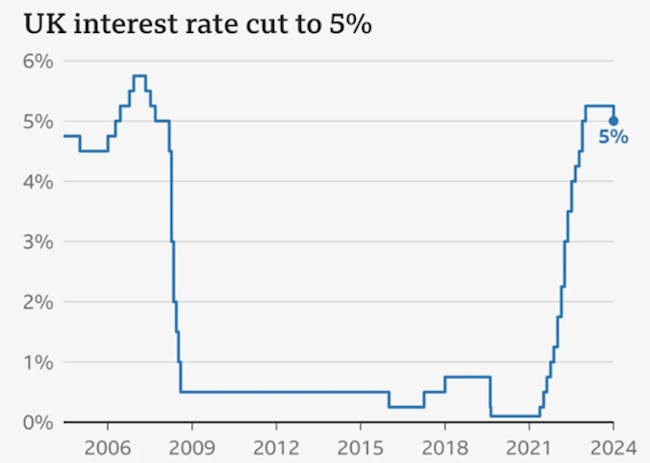Governor Andrew Bailey - who led the 5-4 decision to lower rates by a quarter-point to 5% - said the BoE's Monetary Policy Committee would move cautiously going forward.
Rates have been on hold for almost a full year - the longest period rates have been left unchanged at the peak of a BoE tightening cycle since 2001, and this is the first cut in rates since March 2020, at the start of the COVID-19 pandemic.

Why was the base rate cut?
The base rate is used by the BoE as a tool to control inflation (the rate at which prices rise). It has a target of 2% for the Consumer Prices Index (CPI) measure of inflation, which is set by the Government.
As inflation was above the target level for more than three years between May 2021 and May 2024, the Monetary Policy Committee (MPC), which sets the base rate, has kept the rate high to try to bring price rises under control. Therefore, with CPI inflation returning to the Bank’s target of 2% in May and June 2024 (as announced in June and July 2024) the MPC has now voted to cut the base rate to 5%.
What does this mean for my mortgage?
For those on a fixed mortgagedeal there is no change for now
If you are on a tracker mortgage that 'tracks' the base rate, you will see your rate come down. This will mean a change to your monthly repayment within days or weeks, depending on when your next repayment is
If you are on your lender’s standard variable rate (SVR), the rate you pay might also come down. You are usually moved onto your lender’s SVR after your fix or tracker deal ends. SVRs can be changed by lenders at a whim, though normally it coincides with change to the base rate.
What should I do, if I am a cash saver?
Savings rates have been somewhat stable this year. For example, the top ‘easy-access’ accounts have floated at around 5%, while the top ‘one-year fixed’ have floated around 5.15% to 5.3%. Now, with the base rate being cut, it is likely that savings rates will dip in the short-term. Often, this is felt by the easy-account accounts first, as they respond to changes in the base rate more quickly.
If you would like to speak to one of our team about how you maximise your savings or investments rates
Get in touchRelated news

Could the rise in interest rates force you into completing a self-assessment tax return?
How could the changes affect you.


